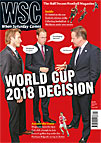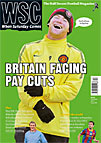 Simon Tyers watches ITV’s build up the Manchester derby, while Wayne Rooney’s Street Striker returns
Simon Tyers watches ITV’s build up the Manchester derby, while Wayne Rooney’s Street Striker returns
This column recently speculated on the appeal to football show producers of David Ginola. He has to be coerced into saying anything of interest but nonetheless has the inbuilt advantages of a French accent and the fact that he’s going grey in a dignified fashion. For these people, Eric Cantona is the lodestone. Write in a couple of aphorisms, allow him to sparkle gently with a sideways look to camera and you’re away. Cantona turned up as the de facto centrepiece of Looking For Manchester, essentially ITV’s preview of a derby for which they had no broadcast rights. It did not promise much for City fans hoping for a fair hearing and, sure enough, all they got was Denis Law’s backheel and a brief clip of the 5-1 derby win in 1989.
